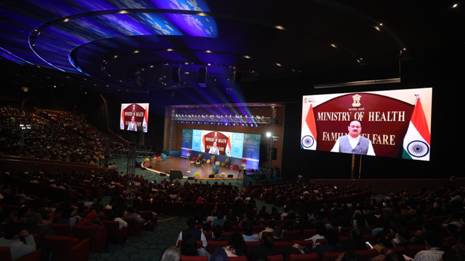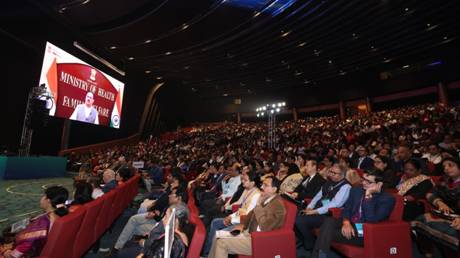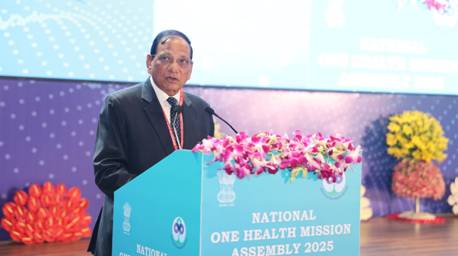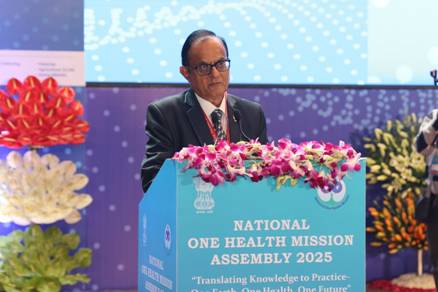Ministry of Health and Family Welfare
Union Health Minister Shri J P Nadda delivers Inaugural Address at the National One Health Mission Assembly 2025 at Bharat Mandapam
‘One Earth, One Health, One Future’ is not just a theme – it is the foundation of our approach to strengthening health security and enhancing preparedness against future pandemics: Shri J P Nadda
“The National One Health Mission is a unique example of whole-of-government and whole-of-society collaboration”
“Joint outbreak investigations and the development of medical countermeasures are underway, strengthening our pandemic preparedness architecture”
Unified and swift response across sectors is essential to confront zoonotic and climate-linked threats: Dr V K Paul
“Need to build a new generation of One Health specialists through joint training and ecosystem-wide capacity building”
प्रविष्टि तिथि:
20 NOV 2025 1:32PM by PIB Delhi
Shri Jagat Prakash Nadda, Union Minister of Health and Family Welfare and Chairperson, Executive Steering Committee on One Health delivered the inaugural address at the National One Health Mission Assembly 2025 through a video message at the Bharat Mandapam Convention Hall, here today. Dr V K Paul, Member (Health), NITI Aayog; Dr Ajay K Sood, Chairperson, Scientific Steering Committee on One Health, Principal Scientific Advisor to the Government of India and Dr Rajiv Bahl, Secretary, Department of Health Research & Director General, Indian Council of Medical Research were also present.
The theme of the two-day event is “Translating Knowledge to Practice – One Earth, One Health, One Future”.

Addressing the gathering, Shri Nadda underlined the timeliness of the Assembly’s theme, noting that it reflects the country’s growing commitment to holistic health and its alignment with global priorities. “‘One Earth, One Health, One Future’ is not just a theme – it is the foundation of our approach to strengthening health security and enhancing preparedness against future pandemics,” he said.
Highlighting India’s progress in health research and innovation over the past decade, the Union Health Minister stated that India has emerged as a major global player in pharmaceuticals and medical science. He recalled the country’s achievements in vaccine development, including indigenous COVID-19 vaccines such as Covaxin, Covishield, Corbevax and the world’s first intranasal COVID-19 vaccine. “India developed and supplied vaccines to more than a hundred countries, reaffirming our role as a trusted global partner,” he noted.
Shri Nadda emphasized that India has also made strong advances in next-generation vaccine platforms – including mRNA, DNA, viral vectors and biosimilars – which have strengthened the nation’s capacity for rapid response to emerging health threats.

Speaking about India’s strides in diagnostics, Shri Nadda said, “In the diagnostics sector, India has become an innovation hub, powered by our talented researchers, growing start-up ecosystem and strong technological capabilities. Solutions like TrueNat, PathoDetect and CRISPR-based tests have made diagnostics faster, more accurate and more accessible.” He also highlighted the role of INSACOG in genomic surveillance and how platforms such as COWIN showcased India’s ability to build high-quality, population-scale digital health systems.
Referring to the National One Health Mission, Shri Nadda described it as one of India’s most significant steps toward pandemic preparedness. The Mission integrates 16 different Central and State Ministries/Departments spanning human health, animal health, environment, agriculture, pharmaceuticals, defence, earth sciences, space sciences and disaster management. “The National One Health Mission is a unique example of whole-of-government and whole-of-society collaboration. For the first time, we have brought together all relevant ministries and departments to work collectively for the health of humans, animals, plants and the environment,” he stated.
The Union Minister expressed satisfaction that the Mission has already begun implementing key activities, including integrated surveillance across slaughterhouses, bird sanctuaries, zoos and wastewater systems in major cities to monitor antimicrobial resistance and infectious pathogens. He added, “Joint outbreak investigations and the development of medical countermeasures are underway, strengthening our pandemic preparedness architecture.”
He further highlighted the establishment of a national network of 23 BSL-3 and BSL-4 laboratories under the Mission. “These high-containment labs are our first line of defence against emerging or mutating pathogens. They will significantly enhance our ability to detect threats early and respond swiftly,” he said.
The Minister emphasized that the One Health approach will enable early warning systems for epidemics and pandemics, support integrated interventions and help India remain future-ready. He congratulated all stakeholders for organizing the Assembly and noted that the Conclave would serve as a valuable platform for collaboration, knowledge sharing and cross-sectoral partnerships. “This Assembly represents the spirit of collaboration, innovation and preparedness. I wish the event great success and hope it paves the way for a safer and healthier future for all,” he concluded.
On the occasion, the BSL3 Laboratory Network SOP Compendium was released which is aimed at ensuring that laboratories adhere to harmonized protocols.
Speaking on the occasion, Dr V. K. Paul highlighted that today marks the beginning of a true Jan Andolan for safeguarding human, animal and environmental health through an integrated, collaborative ecosystem. He noted that the theme of One Earth, One Health, One Future reflects a powerful national mantra that must guide collective action.

Dr Paul underlined that the world continues to confront zoonotic diseases, climate-sensitive illnesses and other emerging threats that do not respect borders. These challenges, he stressed, require coordinated and collective responses across sectors.
With its vast biodiversity and large population, India stands at a unique point of both responsibility and opportunity. The National One Health Mission (NOHM), he observed, is one of the most comprehensive and integrated initiatives ever undertaken in this domain. He emphasized that this is a long-term commitment, aimed at building surveillance networks and mechanisms that connect ministries, institutions and academia through technology-enabled systems.
He noted that significant work has already begun, including surveillance in hotspots where humans and animals interact closely, which is essential to detecting and mitigating emerging risks.
Calling for a “unified and swift response”, Dr Paul stated that outbreak investigation, risk communication and coordinated action must be synchronized across all levels. Ensuring availability of medical countermeasures – vaccines, diagnostics and therapeutics – at scale is equally critical for preparedness.
Dr Paul highlighted that India’s national network of BSL-3 and BSL-4 laboratories is now well-equipped to support early detection and response to One Health threats and future pandemics. He stressed the need to build a new generation of One Health specialists through joint training programmes and by integrating One Health thinking into educational and research institutions.
While national frameworks lay the overall direction, Dr Paul underscored that states will serve as the primary implementing agencies, and their active engagement is crucial to the Mission’s success.
He concluded by calling upon all stakeholders – government, scientific institutions, academia, industry and civil society – to come together in a spirit of partnership to safeguard health security and strengthen the One Health ecosystem.
Dr Ajay K Sood highlighted that in recent years, India has been steadily bringing together what were once considered fragmented sectors – human health, animal health, plant health and environmental systems – into a coherent and coordinated framework. The National One Health Mission, he noted, is the culmination of these sustained efforts. “For the first time, 16 key stakeholders, including States and Union Territories, have come together under a unified platform to advance this integrated approach”, he stated.

He emphasized that the Mission’s agenda reflects both the depth and boldness required to protect people as well as the ecosystems they depend on. He expressed confidence that the Mission will significantly strengthen and accelerate the country’s collective efforts in advancing the One Health paradigm.
Smt. Anu Nagar, Joint Secretary, Dept. of Health Research; Dr Nivedita Gupta, Scientist G and Head, Communicable Diseases, ICMR, senior officials of the Indian Government and representatives from International Organisations and partner agencies were present on the occasion.
***
SR
HFW- One Health Mission Assembly/20th Nov 2025/1
(रिलीज़ आईडी: 2192022)
आगंतुक पटल : 1840